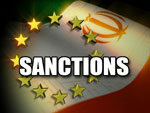 Reuters: The European Union imposed sanctions on Tuesday on an Iranian police unit monitoring the Internet, as well on several judges and media bosses the bloc blames for human rights violations in the Islamic Republic. By Justyna Pawlak
Reuters: The European Union imposed sanctions on Tuesday on an Iranian police unit monitoring the Internet, as well on several judges and media bosses the bloc blames for human rights violations in the Islamic Republic. By Justyna Pawlak
 BRUSSELS (Reuters) – The European Union imposed sanctions on Tuesday on an Iranian police unit monitoring the Internet, as well on several judges and media bosses the bloc blames for human rights violations in the Islamic Republic.
BRUSSELS (Reuters) – The European Union imposed sanctions on Tuesday on an Iranian police unit monitoring the Internet, as well on several judges and media bosses the bloc blames for human rights violations in the Islamic Republic.
The sanctions reflect mounting concerns about human rights in Iran and are separate from measures against Tehran over its nuclear program, which governments in the European Union and elsewhere suspect has a covert military dimension.
The move brings to nearly 90 the number of people targeted by EU asset freezes and visa bans over concerns about human rights in Iran.
Among those newly listed is a judge, Morteza Kiasati, who imposed death sentences on four Iranian Arab political prisoners.
“They were arrested, tortured and hanged without due process,” the European Union said in its official journal. “These cases and the lack of due process were referenced in a report … by the U.N. special rapporteur on human rights in Iran.”
Iran accused the U.N. special rapporteur of bias.
A judge the European Union says was responsible for imposing death sentences on five other Iranian Arabs was also included.
Both cases have attracted international attention, and EU foreign policy chief Catherine Ashton told Iran to stop the executions of the five members of Iran’s Arab minority in January.
It was not clear whether the sentences against the five have been carried out.
Mohammad Sarafraz, the head of both IRIB, Iran’s state broadcaster, and Press TV, the state English-language television news channel, was listed over his alleged cooperation with security services and prosecutors to broadcast forced confessions of detainees. Press TV’s newsroom director was also similarly listed.
The broadcasts included confessions by an Iranian-Canadian journalist, Maziar Bahari, the EU said. He was working for Newsweek magazine when he was arrested in Iran in 2009 and held in prison for four months.
INTERNET CONTROLS
The United Nations said in twin reports last month that Iran has stepped up executions of prisoners, including juveniles, as well as arrests of dissidents who are often tortured in jail, sometimes to death.
One of the reports listed the case of blogger Sattar Beheshti, who was arrested last October after receiving death threats and died some days later in prison. Iranian authorities have arrested seven people suspected of involvement in his death and a judiciary official said a forensic examination had found bruises on the blogger’s body.
In response to the case, the European Union targeted the head of the Iranian government’s organization in charge of online censorship and fighting cyber crime, Abdolsamad Khoramabadi.
“He and his commission actively contributed to the death in detention of blogger Sattar Beheshti,” the European Union said. “Thus the commission he is heading is directly responsible for systemic violations of human rights.”
The European Union also said the cyber police unit had imposed new rules on Internet cafes, requiring users to give personal information that would be kept for six months. The European Union also blamed Khoramabadi and his commission for blocking numerous opposition Internet sites, including Google.
“These new rules may create a logbook that authorities can use to track down activists or whomever is deemed a threat to national security,” the European Union said.
Iranian authorities have stepped up controls over the Internet in recent months, blocking the use of most “virtual private networks”, a tool that many Iranians use to get around the extensive government Internet filter.
(Reporting by Justyna Pawlak; Editing by Rex Merrifield and Jon Hemming)


